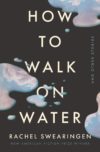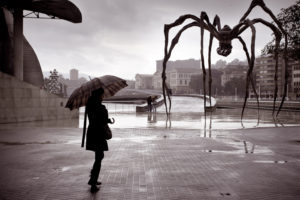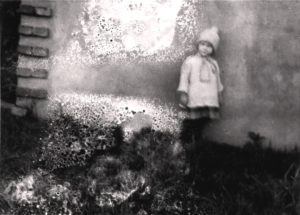The following is excerpted from Brad Fox’s To Remain Nameless (Rescue Press, 2020) and is reprinted here with permission.
To Remain Nameless – Excerpt
Only immediate family, the triage receptionist said. Your friend can wait right here. It’ll just be a minute or two.
Tess watched Laura about to protest, with her flushed face and heaving belly. How can you argue with a woman in labor?
A nurse stood at the swinging doors, trying to lead her patient back into the examination room, but Laura planted both feet and turned to Tess:
You promised you won’t let them give me an epidural, remember? I want to feel everything.—Tess nodded, brown hair falling in her face.—I’m sure I’ll ask for drugs. I’m scared and weak, but don’t listen to me.
As the nurse started to lead her away, Laura pointed at the piece of paper Tess held in her hand.
I’ll ask, Laura said, but you have cotton in your ears. Remember: I want to feel everything.
The doors to the examination room swung shut, leaving Tess under the buzzing lights of triage. She looked down at the paper. Across the top it read LAURA VALERIO BIRTHPLAN.
And there it was, item number one: I am a weakling and a coward.
Tess laughed out loud as she sought her bearings, alone now for the first time in days. Laura a coward and a weakling. How could she ever believe that? But she’d never felt a labor contraction, had no idea how intense it could be.
She dropped down into a black vinyl chair against the wall. The room empty except for the triage receptionist, now talking on the phone with a big smile across her face. Immediate? Who was more immediate than Tess? She felt the cold, air-conditioned air through the loose shirt she wore. She crossed and uncrossed her legs, head still reeling. She looked down at the sparkling tiles.
Labor, she thought. Now it’s starting.
Once in the village above Aswan there’d been a woman in labor, and as they waited for the midwife the woman made such strange noises that Tess walked out into the whitewashed alleyways and paced up and down, stopping in front of the old tomb to ask the dead sheikh what that sound could be.
And now Laura. Laura at 39, who abandoned Tess in the Istanbul office to come back and nurse her own mother on her deathbed, to sit uncomplainingly as her mother wasted away, after working through crisis after crisis, war and famine and bullshit development assignment, now she was in triage, asking for drugs. Give me drugs!
Tess stood back up and took a step toward the door. There was hardly room to pace in here. Her body was awkward and she wished she could be inside with Laura. Wished she knew what there was to do. Wished she’d learned everything there was to learn. What had the Egyptian midwife known? Surely there were things to do in this situation that didn’t involve inserting a tube into your spine. Laura had begged her to be here. Laura who had never asked her for anything:
It’s a pain unlike any other. That’s what I hear. Please be with me.
But I don’t know anything about it, Tess told her. I don’t know anything.
It doesn’t matter. I want you with me. You have to be there.
So she flew from Ataturk airport and landed at JFK and five days later here she was: 7:48 pm, twelfth floor of St. Luke’s Roosevelt, just down from Columbus Circle. Five days and it was like she’d been excised from her life, could hardly remember what awaited her: the caseload, the swelling camps, the endless state of emergency. All that was far away and she was here in this waiting room too small to pace in, pushing her knee against the black vinyl of the chair. The triage nurse gabbing away on the phone and Tess could understand every word. Could not not understand, really. That was closer to the situation. Back in the US, here in this unfamiliar New York, everyone all around speaking her language. When she landed she thought they must be speaking to her. A colleague or a voice over the phone. Did you find out where they’re being held? And how long is the extension? After five days she still wasn’t used to it. Found herself turning her head involuntarily on the street. Who said that? Who was that? Suspicious, a little paranoid. Relax, she told herself. This is your home country. You have every right to be here. It’s important to Laura. And these friendships formed in such conditions, that had lasted this long, it’s important to hold onto something. What else did she have? She had to be here, to be a true friend, at least. If Laura was going to cry and suffer and birth a baby in New York, then she would come. Couldn’t very well leave her alone. The guy was supposed to be around somewhere but Tess still hadn’t seen a sign of him, whoever he was. Laura too proud to push him, probably. But she could ask Tess and she knew Tess would come if she could. And she did. And she had.
But Tess hadn’t expected the triage nurse to make her wait here in the waiting room. Just a minute or two. They lie, Tess thought. She listened for Laura screaming her head off in the next room, about to give birth, for God’s sake, to bring new life into the world. To add another version of herself. Madness. In this country, empire crumbling, waters rising, Manhattan turned over to bankers and tourists. And this receptionist on the phone. Where did she live? Her slight Caribbean lilt. Parents from Trinidad or something. That melody. People of this city, this hemisphere. Never heard that accent in all the places she lived. Did she ever hear that beautiful Caribbean lilt on the streets of Istanbul? A Bronx accent among the doctors in Kosovo? There was a guy from Harlem in Macedonia, what was his name? Richard Bright, or something like that. Or who said he was from Harlem. Who knows where he was from. A white man from Harlem with his bald head and yellow eyes. With his straight spine and his very correct way of speaking. Flattened, stilted, any character hammered out. Like he’d been printed out or was an iteration of something. Later he said he lived in Utah, or somewhere. Montana. Had moved out west from Harlem to teach survivalism. They were sure he was some kind of agent. Everyone was supposedly some kind of agent but Richard Bright with his survivalism and his hammered-out accent was maybe more likely than others. How long had it taken him to learn to talk like that? Perfectly stilted and proper, and underneath, menacing. Is that how they talk in Utah and Montana?
Back home in Kansas City, her half-brother Max used to tell her about his neighbors in the southern suburbs with their big smiles and their clipped lawns and their children locked up in the basement, body parts buried in the backyard.
Eat the liver, Richard Bright said. If you’re trapped in the mountains and the only food is the body of another person, eat the liver first. That’s the most nutritious part.
When she met him the way everyone met in those circles, Tess thought he was a horrible asshole. But that didn’t stop Laura from going to bed with him. Or had it? His shiny bald head bobbing up and down. Go for the liver.
One thing you could say about Laura. She’d always wanted to feel everything.
##
Laura had gone from contract to contract, even quicker than Tess, had been at it longer, too. Liberia, Congo, Kosovo, Brussels, Egypt, Istanbul, finally back in New York. And maybe Tess was forgetting something. Certainly she was. What a horrible life, Tess thought. Always in a white 4×4, with instructions to do something that defied common sense and humanity. Always a new language and new geography, new prejudices, new things to be ignorant of. In order to organize the digging of latrines. Pass out plastic sheeting. Source chlorine gas containers. Organize labor. Assess security. Water security. Food security. Public health and hygiene. Food and nonfood items.
Laura was the one assigned to orient Tess when she flew from Sarajevo to Skopje in 1999, the bombs of the NATO airstrikes already falling on Kosovo just fifteen minutes’ drive to the north. Laura picked her up at the entrance to H2O headquarters, that huge pink building with its ridiculous columns. Some gangster’s idea of a mansion. A provincial gunrunner, sanctions breaker, or something. Now housing the headquarters of an American aid organization, country directors and logisticians and GIS officers. Evil men, Tess thought. Everyone was evil that summer. Except Laura. Who explained the situation and the work to Tess as they drove out to Stenkovec, the first big refugee camp along the border.
They don’t want more Albanians to cross over, Laura said, because they’re afraid they’ll never go home. They’ll swell the Albanian population, which is already like thirty, forty percent, and then there’ll be a secessionist movement here, too.
Which seems like there already is, Tess said. She’d been following the situation for months.
Laura had arrived a few weeks before from Kinshasa and had no idea about the former Yugoslavia. To Tess it was home. She’d already been working in Bosnia for three years, had flown in from Sarajevo where she’d lived with her brother the last two, before that Banja Luka. It felt like hers by then. Not only her little apartment on Tahčića Sokak, but the language she called Bosnian or Serbian or Croatian depending on who she was talking to, or it was just your language, sometimes even ours. Laughing at the inside jokes of her Bosnian friends, the bands and movies, remnants of the old multiethnic socialist utopia. Even Vardar, the name of the river they passed on the way to the border, she’d never seen it but knew the name from old songs. It was swathed in a glow of associations Laura wouldn’t understand.
But all that faded as Tess saw three women trudging up from the edge of the forest toward the razor wire barrier a hundred meters downhill. She watched Laura interrogate the guards at the checkpoint and envied her ability to keep calm as the sullen Macedonians shrugged, and more men, women, and children gathered on the slope.
I should write my questions in lipstick across my breasts, Laura said. Then maybe he’d pay attention.
Tess and Laura were friends by the time they drove back into the city, before Tess started her contract and they were up at dawn to run from site to site through the blazing heat of the summer. Then nights drinking cold wine on the top floor of the house up on Vodno with its balcony overlooking the kidney-shaped pool next door. Sitting there after the endless days, cursing the clenched throat of Tony Blair as he promised more aid. Until the unbearable heat would finally subside under the whir of the Apaches that hovered above downtown.
We should go on strike, Tess said. Tell them fuck your relief budgets, we’re not going to fight your war for you.
Laura nodded and smiled as she refilled their glasses:
Exactly. Let everyone starve. Then they’ll understand.
It was the first time Tess had been under pressure like that, but Laura had believed in her right from the start—You can do this, Laura told her. You’ll be great—when Tess had never seen real conflict before. The Dayton Peace Agreement was already in effect by the time she got to Bosnia. The work in Sarajevo was just pushing through process, return and resettlement. Then everyone rinsing their heads in the basements and bars of the city. But now Tess found herself in a situation that was really happening, right now. Adrenaline shot through her veins as she and Laura raced around in those white 4x4s, out to the camps along the border, kept an eye on the black market networks in the western mountains, occasionally escaping for a mad dash to Ohrid, DJ sets in caves and pink trout flipping in the lake, then in a rush back to the office to grab gear, corral staff, meet engineers, assess landgrades, as fields filled up with more and more tarps and tents.
The backup in no-man’s-land, rainfall on fetid corpses, until the borders opened and people came across so fast they couldn’t build camps fast enough. Tess ended up in mountain villages, bribing mukhtars to house the overflow. They’d fix the road, build a school, whatever, but please, she said, house these people they have nowhere to go.
Until the bombs stopped dropping and everyone came down from the mountains and the camps cleared overnight. No one knew what was happening, if there would be mines and booby traps. But the refugees didn’t care, they headed home as fast as they could, and the camps vacated overnight. Now there were new problems across the border: poisoned wells, unsafe houses, the dead and injured to be tended to, returnees settling scores, vengeance, more killing and confusion.
Max showed up from Sarajevo, Laura headed to Prishtina, and Tess stayed on in Skopje to administrate logistics. Her boss in DC called in with details for endless invoices.—Sign, sign, sign! he told her. We need to get those supply lines moving!
She signed order after order, huge shipments of lumber and medical equipment and vehicles. For weeks she signed whatever came across her desk.
Sign! her boss told her.
Only when the CIA auditors scheduled a meeting, and her boss’s line in DC went dead, did she realize he and the local procurement officer had been collaborating on an embezzlement scheme. Tess was implicated and finally fired because of her signature on all those invoices.—Sign, sign, sign!—The adrenaline now froze in her veins.
As she and Max packed up the house on Vodno, Laura called in on the sat-phone from Prishtina, describing columns of Serb tanks, soldiers flashing nationalist symbols as they paraded toward the border with Serbia proper, toward the small towns and isolated villages where Tess would find her next job. Contracts one after another. Meeting Laura again in Cairo, then in Istanbul where they’d be colleagues in the late 2000s, those murderous years that seem quiet now because they came before all the uprisings.
##
To be here, finally, trying to stay calm in this reception area. Tess pictured Laura in triage, contracting in front of the doctor.—Give it to me, doctor. Please. I can’t stand it anymore.—It had been building up all afternoon. Tess heard her as the sun cracked the blinds early that morning—Uuuuuunnnnh—the winces and moans of pain penetrating her disturbed sleep, curled up next to Laura in Laura’s double bed, in Laura’s mother’s double bed, where her mother had recently died, surrounded by boxes of photos and trinkets, the few things left behind. And now Laura was about to bring a new life into the world.
It’s amazing, she told Tess. Life and death and death and life. But I wish my mom could have at least seen the baby. Held it just one time. But no. It was good for her to go. So much pain toward the end.
Now this was a whole new kind of pain, Tess thought. All the period cramps she’d ever complained of. Nothing compared to what Laura was going through.—The drugs, doctor. Give me the drugs!— She pictured Laura sitting on a hospital gurney, hands pressing on her knees.—Uuuunnnh.—The moans and cries that had begun in the morning and grown in intensity through the afternoon. Back in the apartment where Laura leaned over a big purple exercise ball. Squatting over the ball and moaning, her belly hanging low toward the ground and her throat full of those noises, her face far away, or nowhere. She looked up at Tess with her eyes unfocused and her lips just drooping like her belly.
Then all at once it would stop, the strange look on her face would pass and she would be totally normal again.—Wow, that was a good one.—The smile returned to her olive face.—It’s so good that you came, Tess. I couldn’t do this alone, you know. It’s really happening. I wonder if it’s time to go to the hospital.
There was a rule: five, one, one. Five minutes apart, they last one minute, for at least an hour. When it got like that it was time to call a cab. Get her downstairs and into a cab and to the hospital.
Oh. Oh. Oh. Please, Tess. Call. It’s time.
Tess held the overnight bag they’d packed with toothbrushes and changes of clothes. Also the car seat the hospital had told them to bring in order to take the baby home, which was perhaps the clearest sign of what was happening. The seat that had to be filled. Tess took Laura’s arm over her shoulder as they made their way out of the apartment. Stopped in the hallway so Laura could breathe. Waiting for the elevator. Interminably waiting for the elevator, until—ding—they waddled inside and pressed L.
Enclosed in the tiny space. Gravity pulling out Laura’s breath. Tess still and calm for a moment until—ding—the elevator came to a stop and in walked a woman and a little girl.
Laura?
Laura turned her flushed and sweating face toward the woman. Mrs. Lefkowitz.
Oh dear. Are you ready?
Laura continued facing her neighbor, whose face froze in expectancy. Laura’s lip hanging, saying nothing as the doors closed and they rode together to the lobby. The doors opened and Mrs. Lefkowitz stalled for a second.
You first, Laura practically shouted, then turned her forehead to the door and breathed while the woman gathered her daughter and moved out of the way.
I always hated that woman, she said into Tess’s ear as they finally stepped into the lobby. Fake fucking cookbook writer with her recipes. Out the door and into the cab and the cabbie not reacting in the slightest to the moaning and panting coming from the backseat as he drove the few blocks uptown. The afternoon light as they rounded the corner off 10th Avenue to get to intake.
A moving van backed up, its reverse warning beeping maniacally. Oh, oh, oh.
Until they were out and into the harsh lights of the entrance to Roosevelt Hospital. The guard slouched at his desk. And they were into the elevator, a big slow aluminum-walled elevator and up to the twelfth floor and into triage, to this room where Tess stood now, with her knee against the vinyl of the chair, trying to steady her breath and calm her nerves.
The triage nurse reappeared from the back room, now followed by a woman in a white coat:
Tess?
Yes?
This is Dr. Shen. She’s Ms. Valerio’s doctor.
The doctor smiled at Tess.
You can follow me, the doctor said. She’s been admitted.
And is she medicated?
Lord no, she wouldn’t hear of it. I asked her how she was doing, if she wanted to be hooked up to the pain medication, but she told me under no conditions.
**
Brad Fox is a writer currently quarantined in Peru. His work has appeared in The New Yorker, Guernica, and The Whitney Biennial. His novel, To Remain Nameless, was published by Rescue Press in 2020. He has worked as a journalist, researcher, and relief contractor in the Balkans, Mexico, the Arab World, and Turkey.
**
Music by Catlofe
Brad Fox Brad Fox Brad Fox Brad Fox Brad Fox Brad Fox Brad Fox Brad Fox Brad Fox Brad Fox Brad Fox Brad Fox Brad Fox







